Introduction:
Did the radical left push too far, too fast? The Black Lives Matter riots of 2020 and the COVID-19 lockdowns that allowed parents to peer into their children's education have led many to answer with a resounding, “Yes.” Never before in American history have issues in higher education and K-12 schooling come to public consciousness quite like they have in the past few years, and real progress to resolve these issues has been made in recent months.
In 2023, the United States Supreme Court ruled that affirmative action initiatives were unconstitutional, and several states have moved to restrict—and in some cases ban outright—so-called “diversity, equity, and inclusion” initiatives.1 Representatives with the House Committee on Education and the Workforce investigated the antisemitic campus climates of the University of Pennsylvania, the Massachusetts Institute of Technology, and Harvard University.2 In the aftermath of that hearing, UPenn’s president resigned. Harvard’s president, Claudine Gay, resigned a few months later after it was revealed that she is a serial plagiarist. Major donors of these institutions have pledged to stop donating, and third-party audits of the scholarly work of these institutions are currently underway.3
Still, whether the popularity of DEI and acceptance of DEI’s associated problems are truly in decline on college campuses is difficult to tell. While the aforementioned progress is real, some pockets of America’s academic archipelago have doubled down on DEI initiatives, and the Biden administration itself has encouraged colleges to skirt the Supreme Court’s ruling on affirmative action.4
This study collected over 7,850 titles of articles, chapters, books, etc., hosted on the Google Scholar database, with each title containing a DEI-related keyword and with each title having a year of publication from 1998 to 2023. This collection and subsequent analysis were done under the hypothesis that if academics perceive DEI to be popular, they will continue to produce scholarly work on the subject, as such production would be advantageous to career advancement. If so, recent production rates of DEI-related works should have either increased or plateaued. If academics no longer perceive DEI to be popular, or at least perceive DEI to have declined in popularity, they will avoid producing scholarly work on the subject, as it would no longer be advantageous to career advancement. If so, recent production rates of DEI-related works should have declined.
Our results clearly indicate the latter scenario to be the case. Based on the data we obtained, the rate of production of DEI-related work has fallen significantly since the end of 2020.
Methodology:
Using Harzing’s Publish or Perish software, 25 scans of the Google Scholar database were conducted across several days in late January to early February 2024. Each of these scans focused on specific keywords associated with DEI, including the terms “Diversity, Equity, and Inclusion” themselves. While each of these scans focused on different keywords, all of the scans had the same time frame, set from 1998 to 2023, to get the clearest picture of Google Scholar’s contents over the past quarter-century.5
The raw material acquired from these 25 separate scans netted 18,516 titles, many of which overlapped and some of which were irrelevant. For example, a title with the words “transgender feminism” would have been picked up in the scan for “transgender” and in the other scan for “feminism.” Likewise, the scans on “diversity” and “equity” netted titles irrelevant to DEI, such as titles regarding genetic diversity and financial equity. Recognizing these issues, the raw dataset of 18,516 titles was de-duplicated to remove any overlap across the 25 scans, and filters were created to identify and retain only those titles relevant to DEI programmatically.
This process of de-duplication and filtering was conducted with each new scan, and the scanning process was terminated once few to no new results were making it through the process, which indicated that either no new material was being harvested by the Publish or Perish software, or we had simply exhausted the Google Scholar database. In the end, we discarded 10,632 titles (~57% of the dataset) identified as either duplicates or irrelevant works and removed them from the dataset, leaving only 7,884 titles. This cleaned dataset was then reviewed by sampling titles to ensure that no irrelevant titles made it through the filters, and this sampling process was repeated until researchers were satisfied.
The subject keywords of the 25 scans are as follows, with variations of spelling used in each scan to ensure the best results. For example, “diversity, equity, and inclusion” was also capitalized as “Diversity, Equity, and Inclusion” in the same keyword search. After the fourteenth scan, we began repeating or combining keywords with the maximum number of returns increased from 500 to 1,000 to ensure new material and assess the overlap between similar scans.
- Diversity, Equity, and Inclusion
- Anti-Blackness
- Critical Race Theory
- Anti-Racism
- Transgender
- Queer / Queering
- Postcolonialism
- LGBT / LGBTQIA
- Systemic Racism / Systemic Oppression
- Drag Queen / Drag King
- Gender Binary / Gender Spectrum
- Fat Studies / Fat Liberation
- Postmodernism
- Critical Theory
- Diversity, Equity, and Inclusion
- Anti-Blackness
- Transgender
- Systemic Racism / Systemic Oppression
- LGBT / LGBTQIA / Queer / Queering
- Anti-Racism
- Critical Race Theory
- Implicit Bias
- Gender Binary / Gender Spectrum
- Postcolonialism / Decolonization
- Critical Theory / Postmodernism
Results:
As the various scans produced less and less new material, the trend line observed through repeated de-duplication, filtering, and graphing of the material began to congeal until little variation was seen between graphs with the addition or exclusion of the most recent material. Upon termination of the scanning process, the following figure was produced, which paints a very clear picture. DEI-related work grew steadily in popularity until 2012 when publication rates increased sharply. These rates jumped again in 2016. Publication rates then declined yearly until a slight uptick in 2019, followed by a massive spike in 2020. Yet after 2020 and to the present day, publication rates of DEI-related works have rapidly declined, only appearing to level off somewhat in 2023.
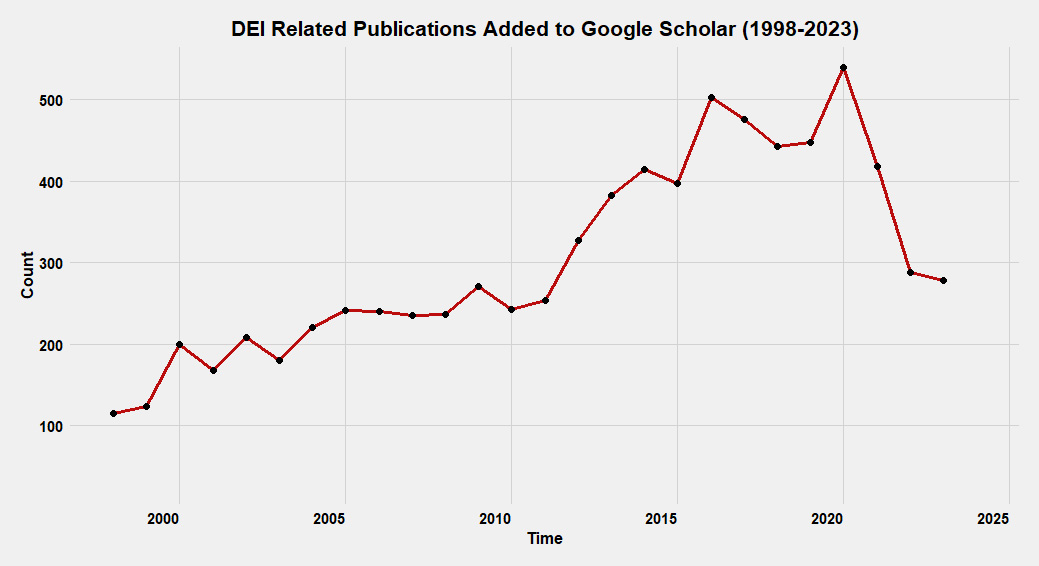
From this full dataset, we then made subcategories based on race and sex. In both, we observed trends similar to those in the full dataset: more rapid publication rates after 2011, peaks in either 2016 or 2020, and rapid declines in the few years after 2020.
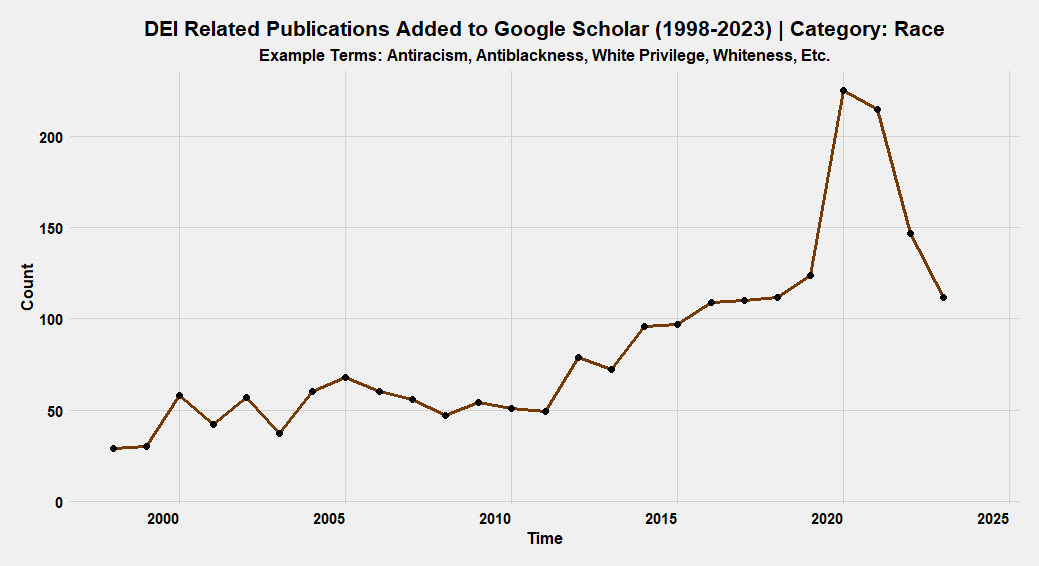
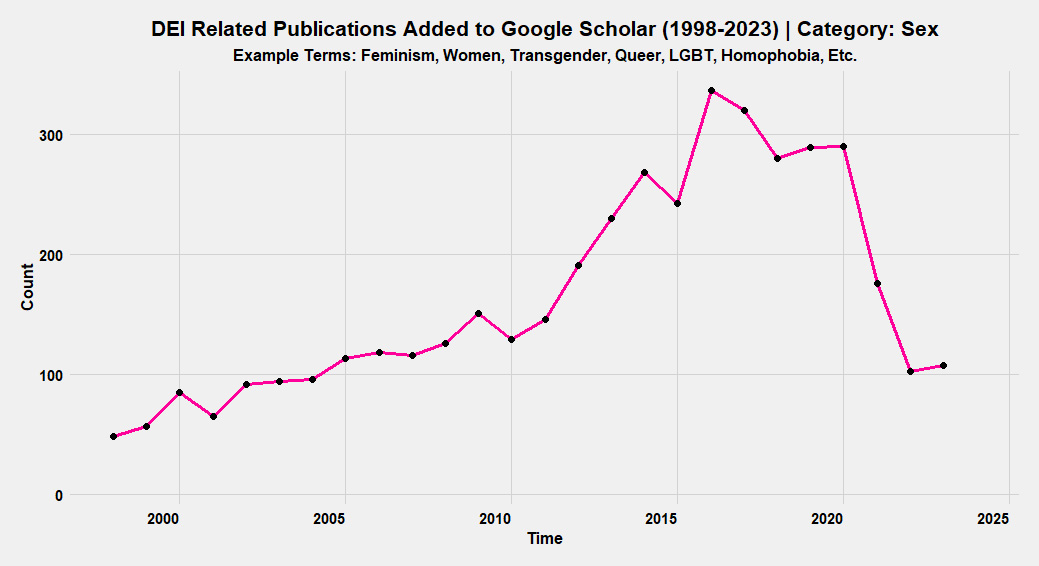
We then created an additional subcategory that focused explicitly on the more radical elements of the sex subcategory, using only terms such as “Transgender,” “Queer,” and “Drag Queen” rather than more common terms such as “Women,” “Feminism,” or “Homophobia.” Here, too, we observe a significant decline in publication rates after 2020, the most significant decline of all, considering that publication rates in this subcategory have fallen to near 2002 production levels.
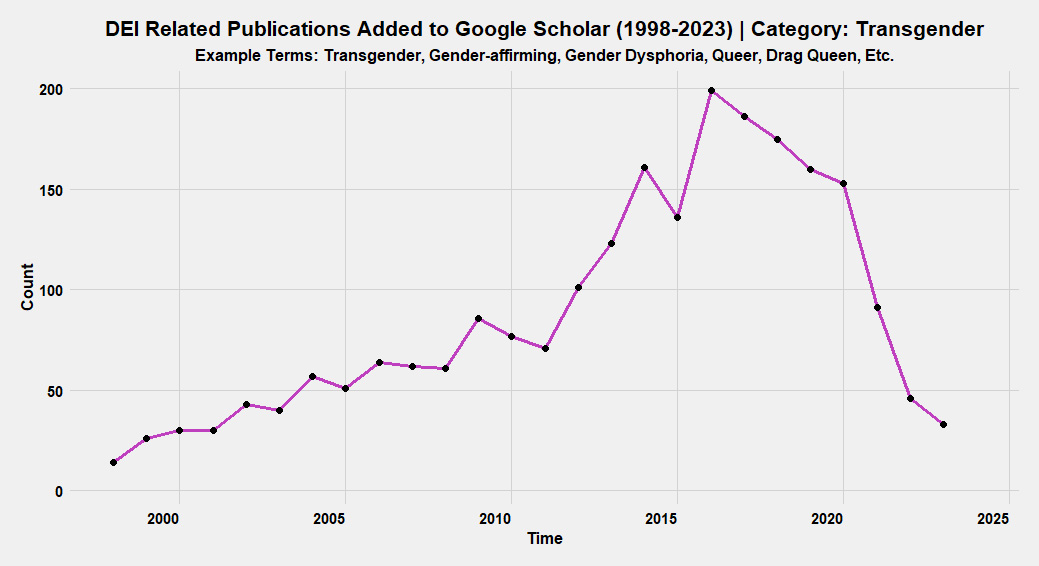
The only subcategory to not exhibit this post-2020 decline was the subcategory on Postcolonialism.
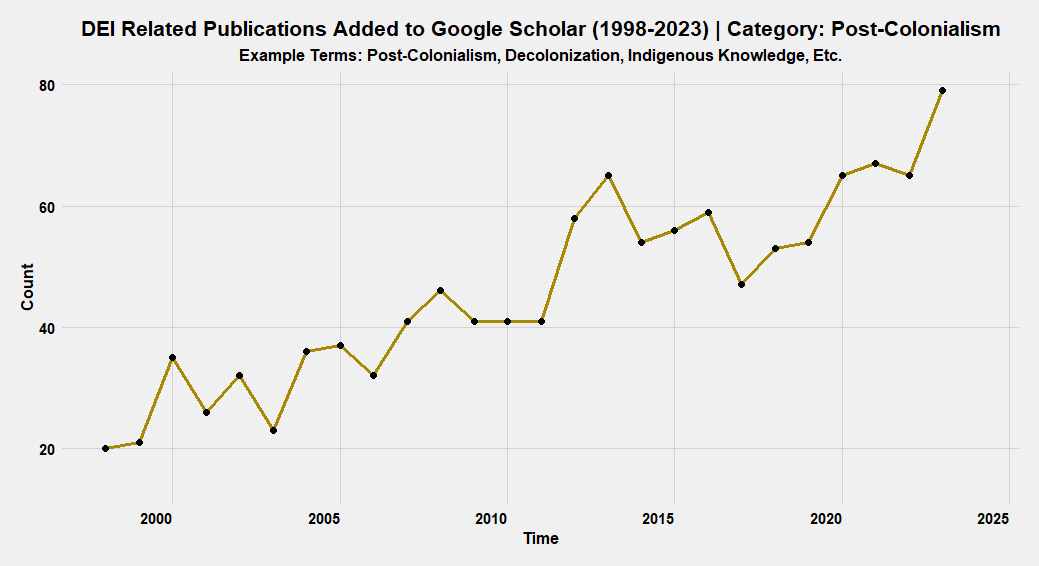
General Discussion:
As the data clearly indicates, production rates of DEI-related scholarship have significantly declined in the few years since 2020, and some evidence suggests that the decline may have begun as early as 2016. The only subcategory where this decline was not observed was the subcategory of “Post-Colonialism,” which included other keywords such as “decolonization,” “indigenous knowledge,” and so on. The fact that this subcategory did not reflect the decline came as a surprise to researchers, because this study was predicated on the initial results of Google Scholar scans regarding “decolonization” conducted in November 2023, that showed declines like those seen elsewhere.6
Potential reasons for this discrepancy may be because the initial scans in November 2023 were too close to the October 7th Hamas attacks in Israel, which reignited public discussion of post-colonialism and decolonization but did not allow adequate time for scholarly production and publication before the scans took place. Likewise, it is also possible that the initial scans in November 2023 were much more in-depth than the scans done here. Indeed, the 2023 scans included additional keyword searches such as “Eurocentrism,” “Reindiginization,” “Whiteness,” and “Cisheteronormativity,” the latter two of which often overlap with Post-Colonialism but are more often attributed to Critical Race Theory and Queer Theory respectively. Whether more in-depth scans in the Post-Colonialism subcategory will reveal similar declines remains to be tested.
Statement of Transparency:
The work that went into this report involved constructing a new dataset with original data scraped from the internet. That data was processed and then displayed in the above graphs. At each step of these processes, both in the collection of the data and the analysis of the data, choices are made that can alter the results of the report significantly. To ensure the integrity of such work, we have uploaded all the data and the R code used to filter and graph the data, to the National Association of Scholars’ repository on GitHub, in file misc/gs_scans_1998_to_2023. This public repository, free of charge, will allow other researchers and analysts to scrutinize our methods and replicate our results for themselves.7
1Students for Fair Admissions, Inc. v. President and Fellows of Harvard College, 20-1199 U.S. (2023) https://www.supremecourt.gov/opinions/22pdf/20-1199_hgdj.pdf; Vimal Patel, “Utah Bans D.E.I. Programs, Joining Other States,” New York Times, February 1, 2024, https://www.nytimes.com/2024/02/01/us/states-anti-dei-laws-utah.html#:~:text=Eight%20have%20become%20law%2C%20including,faculty%20and%20staff%20diversity%20trainings.
2 Reuters, “LIVE: House hearing on handling of antisemitism at Harvard, University of Pennsylvania and MIT,” YouTube Video, December 5, 2023, 3:22:50, https://www.youtube.com/watch?v=FPIN0RVaExo.
3 Stephanie Saul, et al., “Penn’s Leadership Resigns Amid Controversies Over Antisemitism,” New York Times, December 9, 2023, https://www.nytimes.com/2023/12/09/us/university-of-pennsylvania-president-resigns.html#:~:text=The%20president%20of%20the%20University,of%20Jews%20should%20be%20punished. Peter Wood, “After Claudine Gay,” National Association of Scholars, January 24, 2024, https://www.nas.org/blogs/statement/after-claudine; Emma H. Haidar and Cam Kettles, “Billionaire Megadonor Ken Griffin Says He Will Stop Donations to Harvard,” The Harvard Crimson, January 31, 2024, https://www.thecrimson.com/article/2024/1/31/ken-griffin-pausing-harvard-donations/#:~:text=Griffin%2C%20whose%20donations%20to%20Harvard,historic%20leadership%20crisis%20last%20fall.; Meridith Wadman and Jocelyn Kaiser, “Billionaire launches plagiarism detection effort against MIT president and all its faculty,” Science, January 8, 2024, https://www.science.org/content/article/billionaire-launches-plagiarism-detection-effort-against-mit-president-and-all-its
4 Dave Boyer, “Biden encourages colleges to skirt Supreme Court ruling that bards affirmative action in admissions,” The Washington Times, August 14, 2023, https://www.washingtontimes.com/news/2023/aug/14/biden-encourages-colleges-skirt-supreme-court-ruli/.
5 Regarding the use of Harzing’s Publish or Perish, and as we explained in the National Association of Scholars’ 2022 quantitative study Ideological Intensification, “Google Scholar does not have an application programming interface (API) and Google limits the manner in which web scrapping bots can interact with the site. It is thus difficult to get comprehensive information.” In our 2022 study, we used the search term “power posing psychology” as a control method to ensure that the material scraped from Google Scholar were reflective of the Google Scholar database as a whole. We used this control method because it is well known in the field of psychology that the theory of “Power Posing” rose and fell in influence in popularity. Thus, if this method of using Publish or Perish to scrape Google Scholar produced material reflective of the database as a whole, we should see a rise and fall in the trend line of “Power Posing” related scholarship. Indeed, this trend was the case, and so we were comfortable that our findings regarding DEI—in the 2022 study just as in this study—were reflective of the boarder trends throughout the entire database. See Mason Goad and Bruce R. Chartwell, Ideological Intensification: A Quantitative Study of Diversity, Equity, and Inclusion in STEM Subjects at American Universities, The National Association of Scholars, November 28, 2022, https://www.nas.org/reports/ideological-intensification/full-report; and A.W. Harzing, Publish or Perish, (2007), available from https://harzing.com/resources/publish-or-perish.
6 Mason Goad, “Decolonization Research on Decline but Dangers of the Philosophy Persist,” Minding the Campus, November 14, 2023, https://www.mindingthecampus.org/2023/11/14/decolonization-research-on-decline-but-dangers-of-the-philosophy-persist/; See also The National Association of Scholars, “QuantDEI,/misc/Decolonize GS,” GitHub, https://github.com/NASorg/quantdei/blob/master/misc/Decolonize%20GS/gs_decolonize.R.
7 The National Association of Scholars, “QuantDEI,” GitHub, https://github.com/NASorg/quantdei/tree/master/misc.













